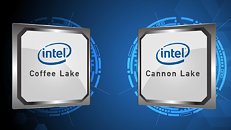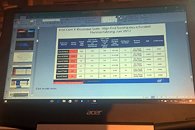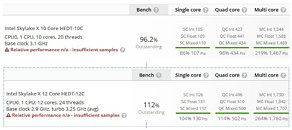Raevenlord
News Editor
- Joined
- Aug 12, 2016
- Messages
- 3,755 (1.22/day)
- Location
- Portugal
| System Name | The Ryzening |
|---|---|
| Processor | AMD Ryzen 9 5900X |
| Motherboard | MSI X570 MAG TOMAHAWK |
| Cooling | Lian Li Galahad 360mm AIO |
| Memory | 32 GB G.Skill Trident Z F4-3733 (4x 8 GB) |
| Video Card(s) | Gigabyte RTX 3070 Ti |
| Storage | Boot: Transcend MTE220S 2TB, Kintson A2000 1TB, Seagate Firewolf Pro 14 TB |
| Display(s) | Acer Nitro VG270UP (1440p 144 Hz IPS) |
| Case | Lian Li O11DX Dynamic White |
| Audio Device(s) | iFi Audio Zen DAC |
| Power Supply | Seasonic Focus+ 750 W |
| Mouse | Cooler Master Masterkeys Lite L |
| Keyboard | Cooler Master Masterkeys Lite L |
| Software | Windows 10 x64 |
It seems that Intel's accelerated released schedule for its upcoming HEDT platform is starting to slowly bear fruits, with many details leaking through the cracks almost non-stop during the last few days (and before you ask, yes, I did have more links to show you.)
These should be two of the top performing processors in Intel's line-up, and the i9 7900X (10-core) and 7920X (12-core) have been tested on integer and floating point calculations. The 10-core i9-7900X (3.1 GHz base frequency, no Turbo listed)) scores 107 points in single-core benchmarks, and 1467 points in the multi-core test. The 12-core, 2.9 GHz base frequency 7920X, however, scores a head-scratchingly-higher 130 points in the same single-threaded benchmark, despite carrying the same architecture at... hmm... lower clocks. Maybe this processor's Turbo is working as expected, up to 3.25 GHz (average), and that's the factor for the higher single-core performance?



The fact that these scores were sourced from userbenchmark.com means that there isn't much reason to compare them between processors - it's an environment lacking the usual control usually found in reviews - so that may also be the reason for the discrepancy. Multi-threaded performance is more inline with what we'd expect to see, though, coming in at 1760 points. You should also note that the Core i9-7900X shows a base clock of 3.1 GHz, 0.2 GHz short of its official 3.3 GHz specification, which means we're probably not looking at final silicon. As always, and this should go without saying, take leaked benchmarks with some amount of salt (a pinch or a truckload, your mileage may vary.)
View at TechPowerUp Main Site
These should be two of the top performing processors in Intel's line-up, and the i9 7900X (10-core) and 7920X (12-core) have been tested on integer and floating point calculations. The 10-core i9-7900X (3.1 GHz base frequency, no Turbo listed)) scores 107 points in single-core benchmarks, and 1467 points in the multi-core test. The 12-core, 2.9 GHz base frequency 7920X, however, scores a head-scratchingly-higher 130 points in the same single-threaded benchmark, despite carrying the same architecture at... hmm... lower clocks. Maybe this processor's Turbo is working as expected, up to 3.25 GHz (average), and that's the factor for the higher single-core performance?



The fact that these scores were sourced from userbenchmark.com means that there isn't much reason to compare them between processors - it's an environment lacking the usual control usually found in reviews - so that may also be the reason for the discrepancy. Multi-threaded performance is more inline with what we'd expect to see, though, coming in at 1760 points. You should also note that the Core i9-7900X shows a base clock of 3.1 GHz, 0.2 GHz short of its official 3.3 GHz specification, which means we're probably not looking at final silicon. As always, and this should go without saying, take leaked benchmarks with some amount of salt (a pinch or a truckload, your mileage may vary.)
View at TechPowerUp Main Site
Last edited:




 sweet I remember the first i7-980x was going to be named i9
sweet I remember the first i7-980x was going to be named i9


